A letter from Burkhard Paetzold serving in Germany
April 2016
Write to Burkhard Paetzold
Individuals: Give online to E200392 for Burkhard Paetzold’s sending and support
Congregations: Give to D506900 for Burkhard Paetzold’s sending and support
Churches are asked to send donations through your congregation’s normal receiving site (this is usually your presbytery).
Dear Friends,
Blessings to you and warm greeting from Berlin/Germany.
I hope you had a wonderful Easter.
A few days ago I returned from an Easter trip to Hungary and Greece and I’m thinking about the many refugees stranded in Greece who may face forced eviction to Turkey according to the EU-Turkey deal. Please join me in prayer for the refugees.
It was a great privilege for me to be part a travel study group with the Moderator of the Presbyterian Church (U.S.A.)’s General Assembly, Heath Rada, his wife, Peggy, and the Director of Presbyterian Disaster Assistance (PDA), Laurie Kraus, as well as Derek Macleod and Taylor Stukes of Myers Park Presbyterian Church in Charlotte, N.C.
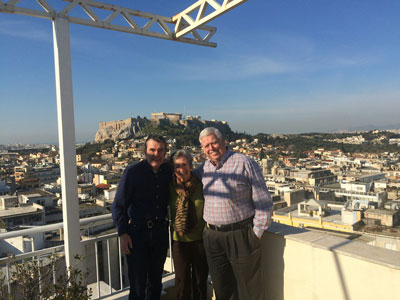 The trip had been initiated by Derek Macleod and others in Myers Park. It was a Holy Week pilgrimage designed to help us experience Christ’s Passion in today’s world. Or as Taylor describes it: “To travel the path of the refugees, to remove the distance between us and them, and to bring into focus the human scale of this immense crisis. And, along the way, we hope to learn lessons on the ground about what is needed, what is working, and what is not. Using the knowledge we will gain and share, together we hope to build up a response—a response that is effective, efficient, and guided by God’s will for us and His world.”
The trip had been initiated by Derek Macleod and others in Myers Park. It was a Holy Week pilgrimage designed to help us experience Christ’s Passion in today’s world. Or as Taylor describes it: “To travel the path of the refugees, to remove the distance between us and them, and to bring into focus the human scale of this immense crisis. And, along the way, we hope to learn lessons on the ground about what is needed, what is working, and what is not. Using the knowledge we will gain and share, together we hope to build up a response—a response that is effective, efficient, and guided by God’s will for us and His world.”
The group started on March 22 in Budapest, Hungary. We met with the presiding bishops of the Reformed and Lutheran churches. We heard mixed messages about the willingness of Hungarians to welcome refugees.
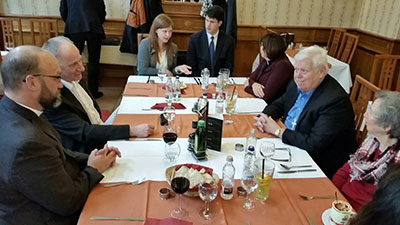 István Szabó, Presiding Bishop of the Reformed Church in Hungary (RCH), describes the “refugee crisis” as a dilemma between “sentimentalism and horror.” Bishop Fabiny of the Lutheran Church sees the role of the churches as being to walk alongside the refugees.
István Szabó, Presiding Bishop of the Reformed Church in Hungary (RCH), describes the “refugee crisis” as a dilemma between “sentimentalism and horror.” Bishop Fabiny of the Lutheran Church sees the role of the churches as being to walk alongside the refugees.
It became clear that prejudice and fear can only be overcome when real people meet each other, hear each other’s stories, and become actively involved. Churches can provide space for this encounter.
In an earlier letter I described the activities of St. Columba, the Church of Scotland congregation in Budapest. We observed Maundy Thursday worship there, and although our group was small, it was a powerful experience. Laurie quotes in her blog from the liturgy for the day:
“…These stories gathered here of people who met salvation in Jesus—
Where lines were crossed and rules broken,
Where there was the promise of redemption for the outcast and foreigner
And inclusion for all who had been excluded—
These kingdom stories are gathered here.
When the stories are so hard and the words run out, I think about those I have met thus far along the way, and those of you at home, and this affirmation rises in my heart:
Blessed are the ones who come in the name of the Lord….”
We also met with Hungarian Reformed Church Aid and Hungarian Interchurch Aid, who are both actively providing humanitarian aid to refugees.
After Maundy Tuesday the group split and Derek and Taylor went with Dora Kanizsai-Nagy, head of the Reformed Refugee Mission in Hungary, to accompany others from Kalunba Charity as they took humanitarian aid to Idomeni, Greece, where 12.000 people were stranded in front of a fence that blocks them from entering Macedonia and moving on north.
We all met again in Athens and took a plane to the Greek island of Samos, located in the Aegean Sea close to the Turkish coast. This island has become the destination for many who seek refuge in Europe. Our plane’s first attempt to land on the island failed because of the strong winds. Looking down at the whitecaps on the water, I worried about any boat people who might be below us.
In a second attempt our plane finally arrived and we spent Saturday afternoon and Easter morning on the island. There we met with Fotis Vlachos of Apostoli, the aid organization of the Orthodox Church in Greece. He took us to what was meant to be a “Hot Spot” to register arriving migrants and has now, after the EU-Turkey deal on March 20, become a detention camp. New arrivals are locked in and stripped of their belongings as if they are criminals. Not even SIM cards for cell phones are allowed. Some 40-50 percent of the refugees are women and children.
We spoke with Red Cross, UNHCR and Doctors without Borders representatives. All assured us that conditions in Turkey will be even worse and that Greece lacks the capacity to gather, register, and send back the 50,000 refugees currently stranded all over Greece.
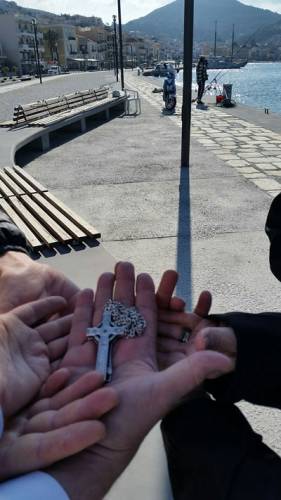 Orthodox Christians in Greece don’t celebrate Easter on the same day that we do in the West, so our group met Easter morning on the beautiful island of Samos near early morning fishermen in the harbor to share our Easter prayer for peace, justice and unity.
Orthodox Christians in Greece don’t celebrate Easter on the same day that we do in the West, so our group met Easter morning on the beautiful island of Samos near early morning fishermen in the harbor to share our Easter prayer for peace, justice and unity.
Back in Athens we met with Efthalia Papa of the Ecumenical Refugee Program. She received us in her tiny office, which was packed with Syrians, Afghans and Iraqis seeking advice. She said that as an Orthodox Christian she doesn’t normally pay much attention to the Pope, but this year she was particularly touched when he called in his Easter blessings: “Don’t you see Christ in your neighbor’s face? Look out the window, there they are roaming on the streets seeking refuge.”
Later we met also Father Malcolm from the Anglican Church and Dimitrios Boukis of the Evangelical Church in Greece. Dimitrios described the current situation in Athens as more and more “chaotic and complicated by the hour. The once ‘transit refugees’ are now an ongoing ‘stream of people,’ confused and puzzled because they see their hopes and dreams at a standstill in extremely poorly organized camps and ‘hot spots.’ No one is really sure what the exact number of refugees is and even worse the government agencies seem to be totally unprepared to handle basic needs for food and ‘room and bath’.”
We witnessed this situation when we went to Piraeus, the Athens harbor where thousands were camping out in pouring rain. The refugees were supported by volunteers, including many from the United States.
After our visit to Greece we flew to Berlin, where we met with the Protestant Church of Berlin-Brandenburg (EKBO) representatives Christof Theilemann and Barbara Killat and the head of their social branch (Diakonie) Barbara Eschen. We stayed in the guesthouse of the City Mission Berlin not far from the huge new Berlin Main Train Station and also within walking distance of a large shelter for refugees. The shelter was crowded and lacked privacy, but Matthias, the contractor from City Mission who showed us around, pointed out many social and community activities and learning opportunities.
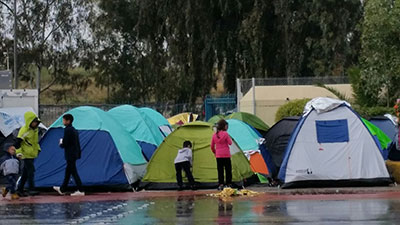 This shelter was meant to be temporary, but since Germany took in almost 1 million refugees in 2015 and was unable to register them in a short time they have had to stay here for several months. Some of the people we talked with suggested that Berlin and other German cities are facing not so much a “refugee crisis” as a “management crisis” because to this day many services are still provided by volunteers. Fortunately and surprisingly, the number of volunteers is large. But some volunteers are “burned out” from their constant commitment and their fight with bureaucracy. It became clear that the sealing of the borders along the Balkans route and finally the EU-Turkey deal are what some Germans think of as much of an “advantage”: Very few refugees arrive nowadays compared with last fall.
This shelter was meant to be temporary, but since Germany took in almost 1 million refugees in 2015 and was unable to register them in a short time they have had to stay here for several months. Some of the people we talked with suggested that Berlin and other German cities are facing not so much a “refugee crisis” as a “management crisis” because to this day many services are still provided by volunteers. Fortunately and surprisingly, the number of volunteers is large. But some volunteers are “burned out” from their constant commitment and their fight with bureaucracy. It became clear that the sealing of the borders along the Balkans route and finally the EU-Turkey deal are what some Germans think of as much of an “advantage”: Very few refugees arrive nowadays compared with last fall.
With us in Berlin was Doris Peschke from Brussels (The Churches’ Commission for Migrants in Europe), who was able to put our experience into a wider perspective. She noted that double standards, fear, and lack of faith are easy to manipulate if people don’t address the root causes and don’t take the risk of meeting refugees personally and learning about their situation in trying to adapt to a different culture.
European churches together with the PC(USA) have insisted that resettlement would be a safer alternative to the risky and often deadly sea passage and would also undermine the smugglers’ business. At the same time it would reduce the challenge of a chaotic spontaneous arrival that is not easy to manage. “The Obama Administration has set a goal for the U.S. to resettle 10,000 Syrian refugees this fiscal year compared to Canada’s commitment to resettle 37,000 Syrians. The UNHCR had asked for 130,000 resettlement places worldwide. Church World Service has called for the resettlement of 100,000.”
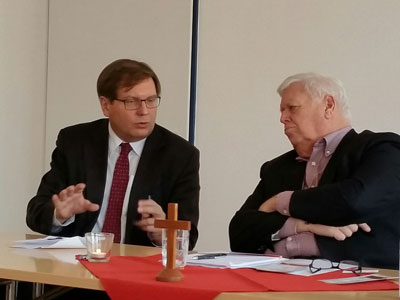 It became clear to all of us on this pilgrimage that we face a global, not just a European, crisis. We learned that there are currently 60 million refugees worldwide. We face a global crisis that needs global answers. We need global solidarity and cooperation, including a strengthening of the UN’s capacity to respond to the crisis, more than ever. I echo the call issued by the German Evangelical churches last September: “With concern we note the underlying causes of the refugee movements: climate change, wars, persecution, failing states, extreme poverty. Our society is often profoundly involved in these reasons for fleeing through global trade relations, weapon deliveries and particularly through a lifestyle that is using up the earth’s resources. It is time to repent and turn away from these unjust practices.”
It became clear to all of us on this pilgrimage that we face a global, not just a European, crisis. We learned that there are currently 60 million refugees worldwide. We face a global crisis that needs global answers. We need global solidarity and cooperation, including a strengthening of the UN’s capacity to respond to the crisis, more than ever. I echo the call issued by the German Evangelical churches last September: “With concern we note the underlying causes of the refugee movements: climate change, wars, persecution, failing states, extreme poverty. Our society is often profoundly involved in these reasons for fleeing through global trade relations, weapon deliveries and particularly through a lifestyle that is using up the earth’s resources. It is time to repent and turn away from these unjust practices.”
I am deeply grateful for your prayers and your financial support. This allows me to be your representative in God’s mission in this critical situation. Please continue to pray. Please continue to give. Please continue to advocate on behalf of refugees worldwide.
Grace and peace to you all,
Burkhard
![]() You may freely reuse and distribute this article in its entirety for non-commercial purposes in any medium. Please include author attribution, photography credits, and a link to the original article. This work is licensed under a Creative Commons Attribution-NonCommercial-NoDeratives 4.0 International License.
You may freely reuse and distribute this article in its entirety for non-commercial purposes in any medium. Please include author attribution, photography credits, and a link to the original article. This work is licensed under a Creative Commons Attribution-NonCommercial-NoDeratives 4.0 International License.